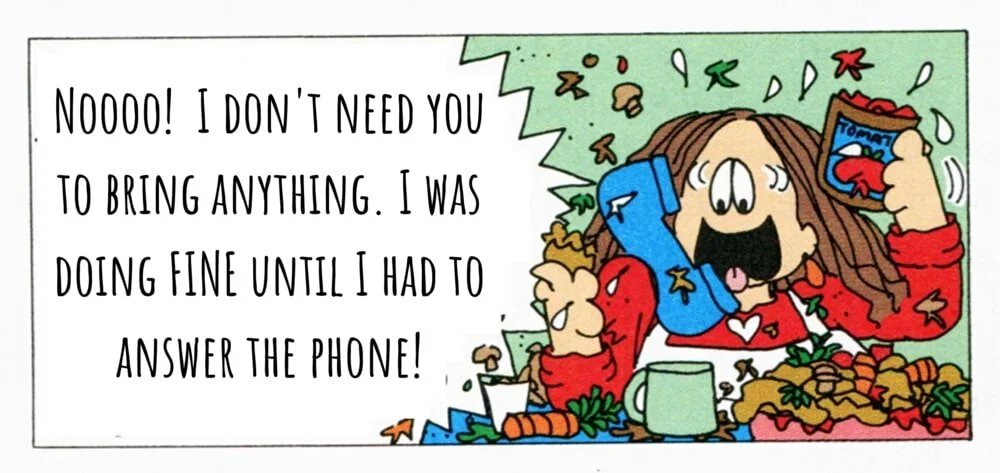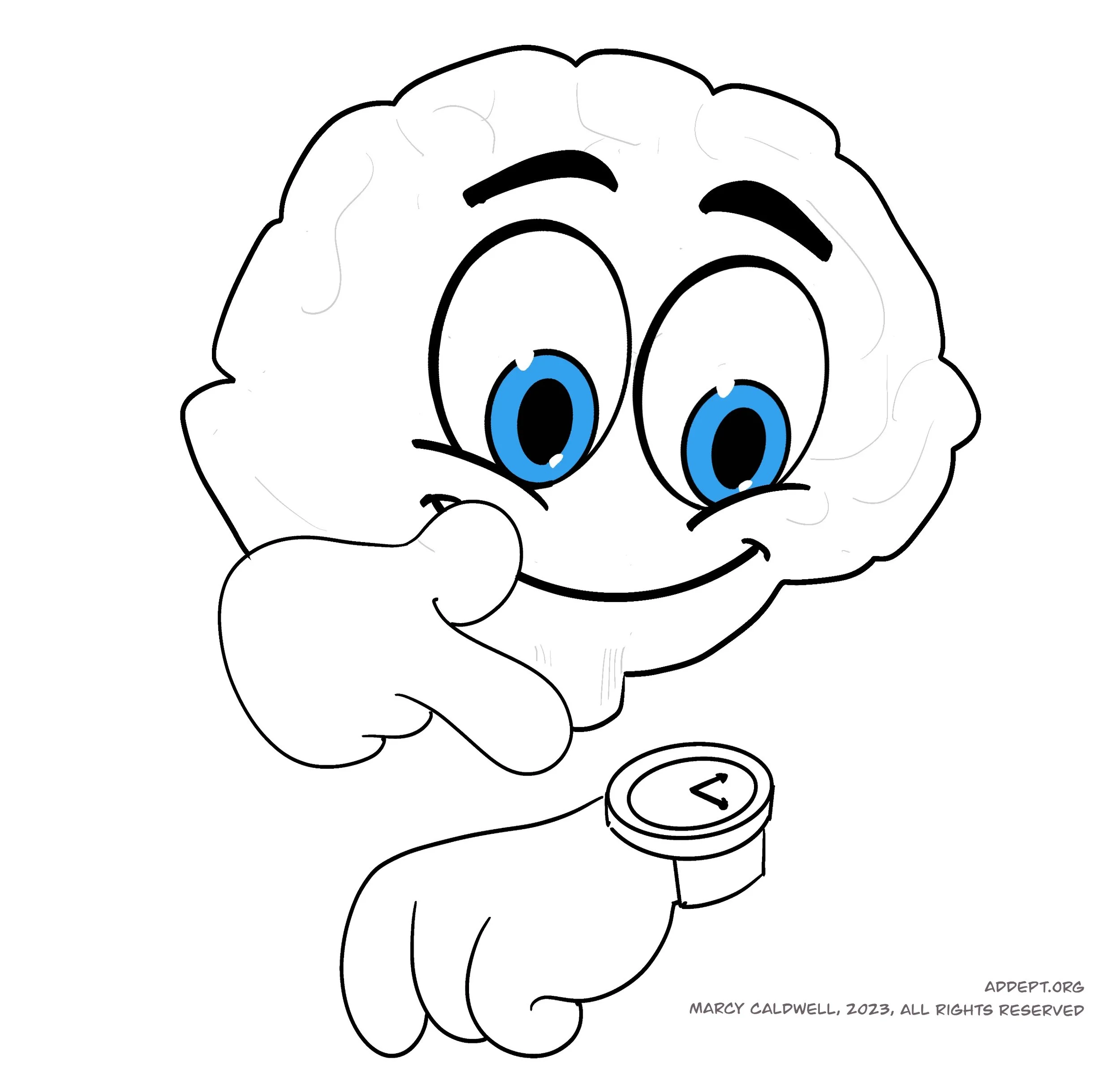Cooking and ADHD:
The Real Reason Feeding our Bodies is So Hard on our Brains [2023 Update]
Cooking with an ADHD brain can be extremely challenging due to the intense executive functioning demands involved, causing frustration, stress, and, ultimately, burnout. Understanding what about cooking makes it so hard allows us to develop brain-based strategies to ease the struggle.
Ever tried to whip up that mouth-watering meal your fam has been drooling over— you’ve got pots and pans juggling on the stove, trays in the oven, and a dish mountain that could rival Everest in the sink?
Then, lo and behold, someone dares to waltz in and pop a question. Yeah, you know what I'm talking about.
THE AUDACITY, RIGHT?
Suddenly, it's a proper meltdown moment, straight out of an 80's Cathy cartoon:
Or maybe none of this rings a bell because the very thought (let alone the action) of cooking strikes such terror into your heart, that you'd rather live on a steady diet of ramen, Chipotle burrito bowls, and cereal.
Why is cooking so tricky with an ADHD brain (even if you love it)?
To understand what's at play here, we need to review exactly what's up with the ADHD brain and what’s going on with it when we try to do our very best Julia Child impression.
The ADHD Brain and Executive Functioning:
Remember how we've talked about how ADHD is a sort of hiccup (who are we kidding, it's more like a whole belch) in the realm of executive functions?
Executive functions are like the maestro of the brain's symphony. The maestro's the big cheese, right? They're juggling everything from getting the show started and stopped, keeping everyone in tune, deciding who needs to pipe down or step up, scheduling rehearsals, guessing how long the concert will last, and smoothly switching gears between movements. Basically, they're keeping everyone playing in harmony.
Executive functioning maestro's are just as busy as the conductor of the world’s biggest orchestra. They’re in charge of:
Planning tasks/ activities of the brain
Starting/ stopping
evaluating progress
Slowing down/ speeding up
Switching Tasks/ activities
Time Estimation
Focus and attentional control
Emotional Regulation (1,2)
For our ADHD brains, the maestro's got less fuel in his tank than he needs to get us through our day. Each task we take on, each distraction we fight or have to come back from, each big emotion we have to wrangle drains his tank. And when he runs out of fuel, he falls asleep at the podium, letting the band march off to their own beat. And chaos ensues. Each part of our brain playing when, how, and if they darn well please.
It’s why I can (and do) annihilate half a pan of brownies at 9 pm but wouldn't dream of it at 9 am. My conductor's tapped out, and I've lost all fight against my sugar-craving demons. (3)
The Executive Functioning Tasks of Cooking:
So, what’s all that got to do with cooking?
It’s not just that our maestro’s exhausted at the end of the day (the exact time we usually take on this herculean task). Because even at full-throttle energy, cooking paints a daunting picture for our maestro. Why? Let's check out the various tasks involved in cooking:
PLANNING
Deciding what to do, when, how much of it, and in what sequence (because we know chaos doesn’t make a tasty entreé)
TIME ESTIMATION
Calculations like— if the pasta tango with the pot starts now, then the sauce sizzle will have to wait 5 moments- all take the precise measurement and estimate of time.
SWITCHING
With the juggling act from chopping to measuring to stirring, there’s always a new and different task to be done, leaving you the circus performer in your very own kitchen.
FOCUS
Navigating recipes without overlooking pesky details and paying attention to sometimes dangerous tasks like the swordplay of chopping or the scorching dance of frying—these are just a few of the things we need to focus on when cooking.
STARTING/STOPPING
The uphill struggle of initiating the cooking process, hitting the pause button to let something cook, and the restraint not to make the meal plan the next Odyssey are all key factors of the red-light/ green-light game of starting/stopping.
EVALUATING
Playing taste tester and deciding if your sauce needs a l’il bit more of this or less of that and then assessing if your plan to cook the meat first and the potatoes later was the right way to go are both part of the evaluating EF, which’s job it is to assess- is this the right way? What else is needed?
PACE MONITORING
Amping up the speed, knowing that Bessy might turn into beef jerky if it’s not out soon, or downshifting when you realize things are taking longer than your kitchen timer predicted are all the pervue of the EF pace monitoring.
Did you catch that?
These two lists of tasks of our executive functioning system and tasks of cooking are twins, like two peas in a pod! Essentially, cooking is one humongous trial of each and every item in our executive functioning artillery.
Overwhelm, Stress and Overstimulation: Emotional Dysregulation in the Kitchen
Becuase cooking involves a truckload (and I mean FULL to the brim truckload) of executive functioning tasks, trying to get dinner on the table is a huge task. It's the brain equivalent of trying to sprint a marathon. And that long-distance sprint stresses the system to the max.
Now, ADHD brains tend to fall to extremes. Some break out into hives, just considering that level of stress and tension. Other ADHD brains thrive under this pressure- feeling their brains turn on and engage amid the chaos. But, even if you’re a thrill-seeking, pressure-loving, culinary warrior - that's still a lot of heat for one kitchen, right? You’re system is still pushed to it’s max.
What happens when a system’s pushed to its max? Well, it means that it’s just one more request, noise, decision, or task away from:
Confusion
Stress
Irritation
Rage
Exhaustion
Basically, it’s a brain on the verge of ADHD burnout, and it's about as enjoyable as stepping on a LEGO. Barefoot. In the dark.
So, can you blame us when the door swings open and little Joey comes waltzing in asking for a glass of milk, or the phone starts ringing off the hook, or your partner begins to mount a full-scale expedition into the pantry, and it’s suddenly meltdown o'clock?
No. Definitely not.
How to Tame the Culinary Chaos:
The goal for tackling the trauma that can be cooking is all about reducing the number of executive functions involved in the task. So doing things like pre-planning, mapping out timing, chopping and measuring ahead of time, and limiting the number of sensory inputs involved in the task can go a long way towards easing the tole on your system.
There’s a catch, though, right?!? Doing that is yet another thing to do on an already long list of things to do, which is where our 9 ADHD-friendly Hacks to Calm the Culinary Chaos comes in. Check it out!
Do you love or hate cooking? What does it do to your brain? Share your experience in the comments!
Sources:
Diamond, A. (2013). Executive functions. Annual review of psychology, 64(1), 135-168.
Miyake, A., Friedman, N. P., Emerson, M. J., Watter, S., & Hewitt, J. K. (2000). The unity and diversity of executive functions and their contributions to complex cognitive performance. Psychological bulletin, 126(4), 682-718.
Muraven, M., & Baumeister, R. F. (2000). Self-regulation and depletion of self-regulatory resources: Does preactivation really reduce self-control? Journal of personality and social psychology, 78(3), 544-557.
Ready to shift from
meltdown to mastery?
This online course has been designed specifically to help teach the strategies ADHD brains need to help them move from overwhelm and meltdowns to confident emotional mastery.
Want to know more about
thriving with ADHD?
Check out these other articles:

















Why is Task Switching with ADHD so Hard?